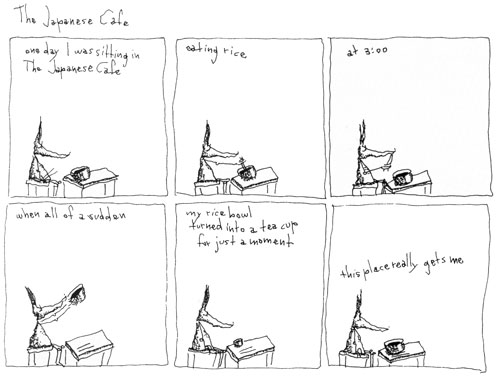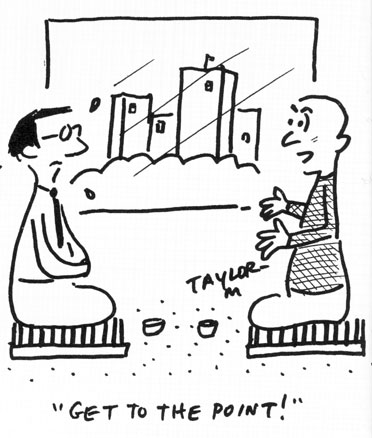Tricycle welcomes letters to the editor. Letters are subject to editing. Please send correspondence to:
Tricycle: The Buddhist Review
92 Vandam Street
New York, NY 10013
Fax: (212) 645-1493
E-mail address: editorial@tricycle.com
Absolute Dharma?
In his illuminating article “One Dharma” (Winter 2001), Joseph Goldstein rightly points out that non-clinging is fundamental to all Buddhist traditions. However, he misleads when he proposes that we think of Buddhism as a “basic pragmatism, rather than an adherence to some philosophical system,” and Buddhist teachings as “skillful means for liberating the mind, rather than statements of absolute truth.”
As presented in the Sutta Pitaka of the Pali canon, the Buddha does express a pragmatic approach by giving primary emphasis to overcoming suffering. In the Culamalunkya Sutta, he declines to answer some metaphysical questions because the answers are not necessary to reach this goal. But he also teaches the Four Noble Truths because they are essential to attain Nibbana. This is the dual message of the famous simile of the man wounded by a poison arrow. These Truths are presented as absolute: their truth is not relative to a particular culture. This is why they are relevant to all human beings, including persons in the West 2,500 years later. And fundamental to the Four Noble Truths are the philosophical ideas of impermanence, dependent origination, and absence of self. Goldstein correctly maintains that the Buddha says we are not to cling to our views or to anything else. This is because it is problematic to regard anything as one’s own, including views. It does not mean there is no right view: the first step of the Eightfold Path is called precisely this. The Buddha’s teaching does not stress practice rather than absolute philosophical truths. It emphasizes practice on the basis of these truths.
—Christopher W. Gowans
Professor of Philosophy, Fordham University
New York, NY
Joseph Goldstein responds:
I appreciate Christopher Gowans pointing out the importance of Right View in the Buddha’s teachings. An understanding of the Four Noble Truths, dependent origination, impermanence, and non-self are the bedrock foundation of dharma practice. By emphasizing them as skillful means rather than statements of absolute truth, I did not mean to suggest that they were relevant only to a certain time or place. Rather, I wanted to distinguish the level of concept – any concept, true or not – from the level of direct experience.
Philosophical statements have the power to point us in the right direction, like fingers pointing to the moon, but they are, in themselves, only concepts. The right view, “all things are impermanent,” is quite different from the wordless wisdom of the mind directly aware of the changing nature of phenomena. This wisdom is beyond the conceptual level, much like the taste of good food is beyond even the most detailed and accurate description of it. Menus do entice us, though, and the Buddha’s profound teachings inspire and encourage us to look and see for ourselves. Perhaps the phrase “universal truths” or “timeless truths” might encompass both the important point that Professor Gowans makes and the need to distinguish concept from reality

A Certain Uncertainty
“September 11: Practice and Perspectives” (Winter 2001) provided me much help and food for thought. I believe that the attacks pushed the world into an arena where new dynamics and new assumptions will be required. I was particularly struck by the articles by Clark Strand and Stephen Batchelor, who both wrote on aspects of certitude and uncertainty. Strand describes how religious fundamentalists and militants possess a certitude that leads to the dualistic belief that “I’m right, and you who disagree with me are destined to go to my hell.” I know many of us have faced a similar absolutist attitude. Middle East terrorist certitude just seems to affirm and bolster American fundamentalist and patriotic certitude.
Batchelor spoke of his need to reassess his Buddhist beliefs in nonviolence, in the immediacy of the threat posed by terrorism. His words echoed my own uncertainty about how to deal with my thoughts and feelings in the post-September 11 world. My previous ways of thinking and reacting no longer seem relevant. Something different is called for.
We are all on new ground since September 11. It’s no wonder we feel uncertain, and each of us should be seriously questioning our beliefs and assumptions. I see no resolution yet – only conflicting and confusing signals of what might be. But I’m now less uncomfortable with my own uncertainty in the face of fundamentalist certitude. Residing with the tension of uncertainty has often been an important discipline for gaining clarity of action when a new chapter has begun. It can allow novel creative responses to arise.
—Geoff Huggins
Winchester, VA
Noble Violence
In “Spaces in the Sky,” Stephen Batchelor asks, “Is the Buddhist commitment to nonviolence but a noble aspiration whose goal can never be reached on this earth?” Noting that the Buddha’s teaching of nonviolence is so pronounced that it is difficult to envisage a full-scale holy war launched in the Buddha’s name, Batchelor points out that this very refusal to respond violently may have contributed to the demise of Buddhism in India against Muslim aggression, or to Tibet’s defeat.
But the Buddha’s teachings need not assure failure against violent aggression. Indeed, in the thirteenth century while Genghis Khan easily conquered most of Asia and Europe, his half-a-million-man army was decisively defeated in Buddhist Japan, and in Vietnam during the Tran dynasty. In fact, a Tran emperor relinquished his throne to become a monk and a founder of the Truc Lam Zen sect. Earlier, the first emperor of Vietnam’s Ly dynasty not only crushed the Chinese invaders but also sent his troops deep into mainland China before pulling back to preserve peace, knowing that ultimately, China was the more powerful nation. This Ly emperor was a devout Buddhist, trained since his childhood by a Buddhist monk.
I remember the Dalai Lama’s reply to Professor Jan Willis of Wesleyan University when she asked about an appropriate response to racism in the sixties: “If you feel anger and deep hatred for the policeman, do nothing, let him shoot you. But if you are able to feel sincere compassion for his ignorance and agitated state of mind, then out of your concern for fairness and the welfare of everyone involved, use any effective means to respond.” The Buddha taught self-reliance and wisdom. In the end, with a full understanding of the cause and effect of their actions, his followers must make their own decisions based firmly on compassion and the precise conditions prevailing in each situation.
—Khanh Nguyen
Email

I agree with Stephen Batchelor wholeheartedly when he writes about the challenge facing all of us in trying to avoid “the oppositional rhetoric of ‘us’ versus ‘them’” as we struggle to comprehend recent events.
I wish, however, that he had applied this principle himself before characterizing the language of the Qur’an as “bellicose,” “divisive,” and “warlike” in contrast to the Pali canon. In truth, the Qur’an is about nothing but compassion, but “compassion sometimes has to be harsh,” as Rimpoche Nawang Gehlek writes elsewhere in the same practice section. A highly selective reading of the Qur’an does not do justice to the complexity and richness of its message. The Buddhist canon is just as vulnerable to distortion when read in a similar manner.
It’s a good thing to feel that the path one has chosen is the best path. But it is divisive to say that nonviolence is “our” message, while a generous license to kill in God’s name is “their” message (that of the monotheistic religions). I am not a Buddhist, but I have learned a great deal from reading Tricycle and other Buddhist writings. I hope that Buddhists can learn as well from reading about Islam with an open mind.
—Kristin Sands
Arabic Language Lecturer
New York, NY
Humor As Path
The article on Bernie Glassman Roshi’s new order of dis-order (Winter 2001) was refreshing! As America’s karma shapes its own form of Buddhist practice, there is an all-too-common pull toward constant seriousness. Seriousness in effort is achieved as much in the humor of seeing ourselves as we really are, as it is in constant, single-focused, unfeeling practice. In reality these things are not one and also are not two. As much as we burden ourselves with the weight of the bills, kids, and relationships, it is wonderful to see that our practice does not have to fall into the bushy brow of bodhidharmic rigidity. Thank you for teaching, Glassman Roshi, and thanks for the laughs.
—Gary Morgan
Newark, Delaware
Yuppie Dharma
In the Winter 200I issue, Judith Lief exhorts us, in the wake of September 11, to face up to how attached we have
been to our privileged and sheltered lifestyle. She identifies herself as a student of Chogyam Trungpa Rinpoche,
and says that he sometimes compared our lifestyle to a “god realm” existence. Lief goes on to write that the
“pseudo-security of the god realm is based on deliberately ignoring the larger world and hunkering down in a
safe haven where we can enjoy pleasures at all levels-mateial, emotional, and spiritual.” “We need,” she writes,
“to go beyond ‘yuppie dharma,’ the trendy but shallow self-improvement approach that leaves our basic mindset
unchallenged.”
So I am wondering how this eminently profound view of both Ms. Lief and her teacher squares with Marilyn Webb’s article on the opening of The Great Stupa in Colorado built by Trungpa Rinpoche’s students to honor him and to contain his cremated remains. With a string of superlatives, the author, another student of Trungpa Rinpcoche, touts the stupa as the “first,” the “biggest.” The price tag is $2.7 million—a bargain. . . for what it bought.”
Indeed, this sounds a lot like “hunkering down in a safe haven” to me, and even more, it bespeaks a basic mind-set—one that developed in old Tibet—that is going unchallenged. The conflation of religion and the politics of power have found their newer expression in an architectural extravagance that is far more ostentatious than it is devotional. However one might celebrate this structure in the United States, it seems that on some level, it
cannot be presented as free of the impulses and indulgences of yuppie dharma, in which everything that is first and most and biggest is best.
—Janice Vienbaas
Modesto, California ▼
Thank you for subscribing to Tricycle! As a nonprofit, we depend on readers like you to keep Buddhist teachings and practices widely available.